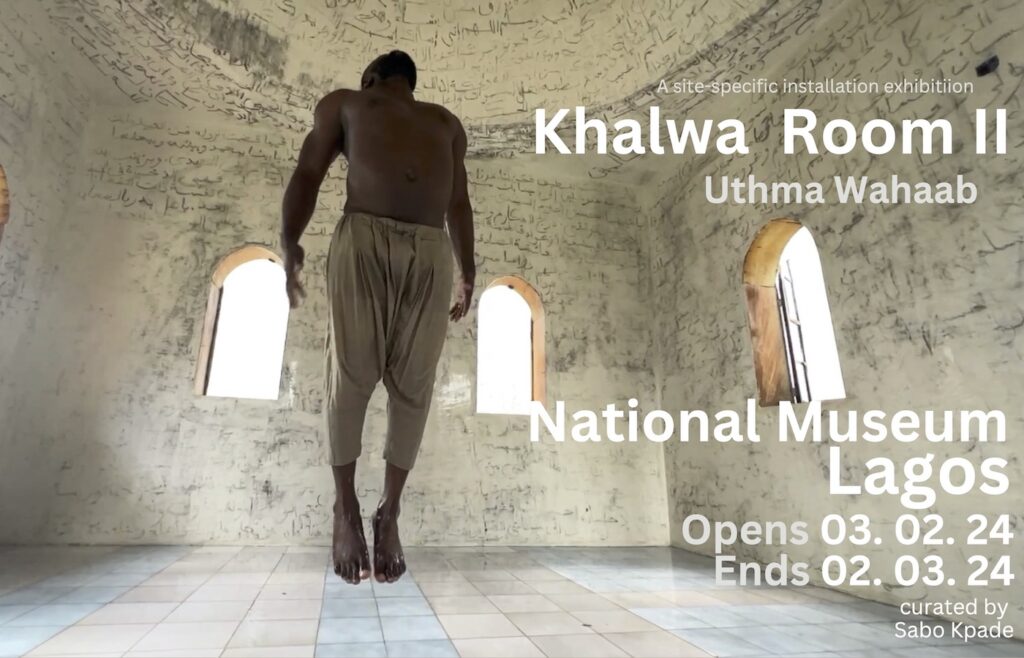National Museum, Lagos, Nigeria
03 Feb 2024 - 02 Mar 2024

Uthman Wahaab, Khalwa Room II, National Museum Lagos, 2024.
Othman Studio is proud to present Khalwa Room II (2024) at National Museum Lagos, Uthman Wahaab’s second showing at the biennale, following his 2019 presentation at Independent Building (Lagos). Taking place from 3rd February — 2nd March, 2024, the exhibition is a part of Off-ish, off- site projects in conjunction with Lagos Biennale 2024 (closes 10th February, 2024).
Khalwa Room II is designed as a site-specific installation, incorporating Wahaab’s multidisciplinary practice including performance and paintings, video work and photography, synesthesia and acoustics. Khalwa Room series is the result of Wahaab’s family’s long-term practice of Sufism, the Islamic practice closely associated with mysticism and spirituality. The artist’s immersive examination of art and religion is staged across two dedicated gallery spaces at National Museum Lagos repurposed, for the sake of the exhibition, as Gallery I and Gallery II.
Conceived as an intervention for rejuvenation and renewal, Khalwa Room II deploys new perspectives to gesturalism through select media combining the personal and the political. Founded in 1957, shortly before Nigeria’s independence from English rule, the Nigerian National Museum (Lagos) is host to major collections of the nation’s material culture that include the famous Nok artefacts and Benin sculptures. Created at the dawn of Nigeria’s own renewal as a sovereign nation, National Museum Lagos remains a symbol of national pride and postcolonial ideas about history, art and architecture.
Gallery I: Khalwa Room (2024)
In the lead up the exhibition at National Museum Lagos, Wahaab will embark on an onsite performance of khalwa rituals and processions in Gallery I. Using charcoal and the gallery’s walls and ceiling, the artist will create abstractions in his signature draughtsmanship, inspired by Islamic calligraphy. The artist combines Kufic script, gesticulation, routine prayer recitals known as lazim and spiritual invitations of ruhu which, in one definition, is the angelic quality bestowed upon humans, but not an angel himself, using his body as tool and surface.
Sadaka
Exhibition visitors are served a variety of seasonal fruits and water in keeping with sadaqa: firstly, as a post-prayer ceremony, and, secondly, as a larger belief in charitable giving as an act of generosity and sanctity: You will never attain piety until you spend out of that which you love. And whatever good you spend, Allah knows it well (Qur’an 3:92). At its root, sadaqa means to make sincere, a reflection of Wahaab’s total immersion into spiritual asceticism, essential to khalwa performance and Sufism as a whole.
Gallery II: Khalwa I (2022-2023)
Khalwa I (2022-2023) is Wahaab incipient staging of khalwa as performance art in which the artist deployed the male body in performance to explore Sufi mysticism and beliefs. Recorded on location in Ibadan (Oyo State) — during the artist’s participation in Kob’omoje Art Residency (2022) — Khalwa Room I depicts ritualised cleansing, using the exhibition’s constituent media of charcoal and water, to investigate themes of physical and spiritual purification in relation to self and space. Documented in one major video work and a photographic series, Khalwa Room I complicates Abstract Expressionist art, by undoing creation in favour of regeneration. Closed to the public and guided by a sheikh, post-khalwa de- installation serves two purposes: as a standalone performance, and as basis for Khalwa Room III, Wahaab’s subsequent instalment of khalwa-inspired performances, which continues the artist’s abiding themes of religiosity and material life, temporal specificity and unfinalizability in art and self making.
Rejuvenating Anfas (2024)
Rejuvenating Anfas (2024) is a conceptual sound work composed of Sufi prayers and ritual chants, text and supplications that are unique interpretations of Islam in West Africa, and Nigeria in particular. Created in response to Wahaab’s calligraphic abstractions, the immersive soundscape draws from a set of sources including live recordings from Quranic healing recitals recorded onsite in Ilorin (Kwara State, Nigeria), Sufi prayer recitals by Dr Sadegh Aleahmad, the British-Iranian multidisciplinary artist and disparate sound banks on the internet, co-produced by Kemi Lijadu, Nigerian-British sound designer and filmmaker. In Rejuvenating Anfas, ambient sounds alternates with sonorous utterings, at times meditative and, at other times, excitable. In rare occurrences, khalwa, when accompanied by these chants and prayers, are trance inducing which some believe necessitates divine visitations.
About The Curator
Sabo Kpade is a writer, curator and researcher who specializes in the arts and cultures of Africa and its diaspora in the UK, US and Europe.